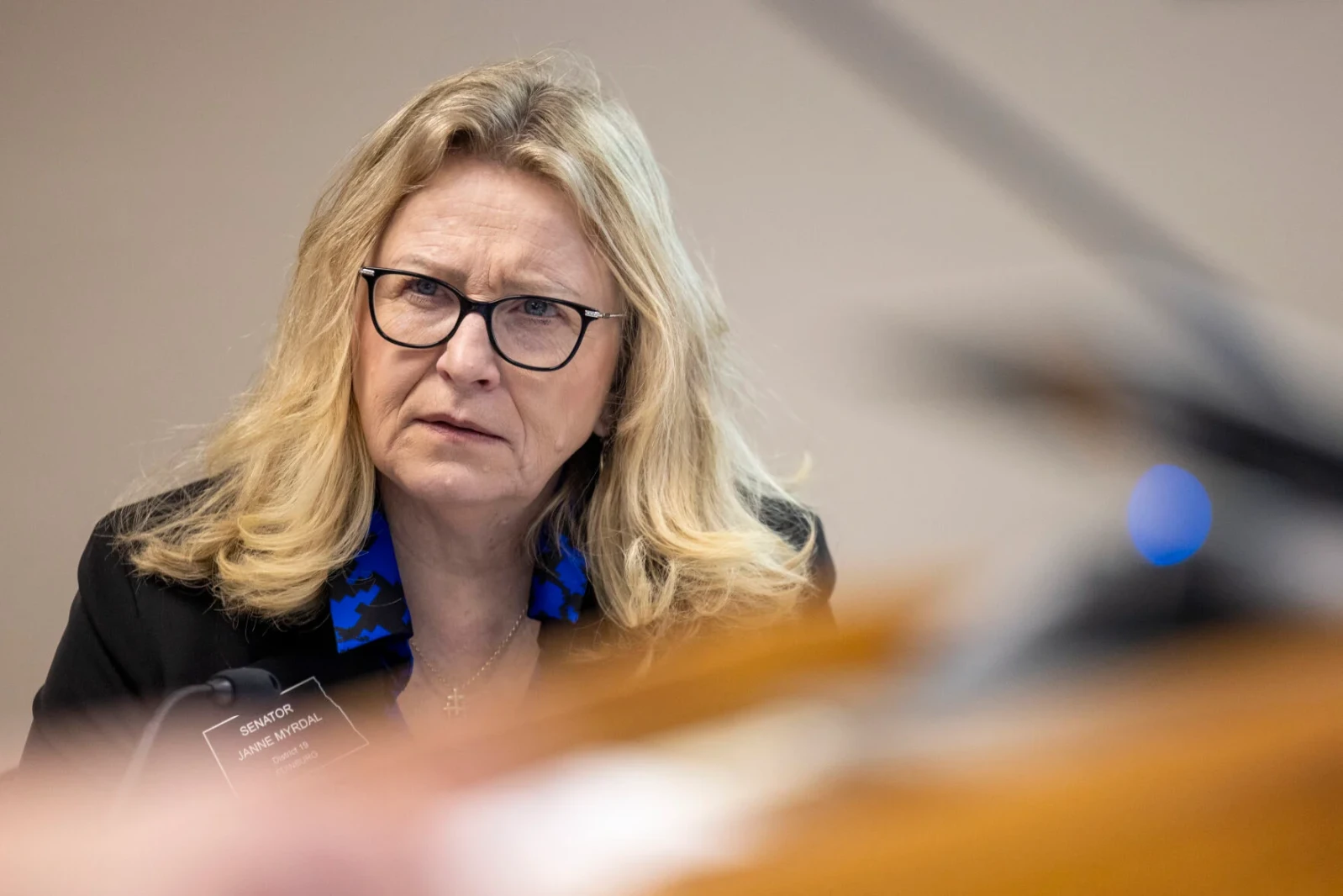## North Dakota Deals a Blow to Gambling Expansion: Senate Shuts Down Commission Abolition
The future of gambling in North Dakota just took a turn, and it’s not the one many expected. In a move that shocked observers, the state Senate has voted to keep the North Dakota Gaming Commission intact, effectively squashing a bill that aimed to dismantle the very body tasked with regulating the state’s burgeoning gambling industry.

Senator Myrdal’s U-Turn: Explaining the Shift in Viewpoint and Support for Abandoning the Bill
From Elimination to Reform: A Change of Heart

The journey of Senate Bill 2224, which initially aimed to eliminate the North Dakota Gaming Commission, provides a compelling case study in legislative agility and the power of stakeholder dialogue. The bill’s sponsor, Senator Janne Myrdal (R-Edinburg), shifted her stance dramatically, ultimately advocating for the bill’s defeat. This U-turn can be attributed to several factors, notably the productive discussions initiated by the bill that led to a potential reformation of the Gaming Commission.
Senator Myrdal’s initial motivation stemmed from her belief that the Gaming Commission had become dysfunctional under the previous administration. Her proposed solution, outright elimination, garnered support but also sparked concern among various stakeholders. The ensuing negotiation process, involving the Attorney General’s Office, the Governor’s Office, and the Legislature, resulted in a revised approach: rather than abolishing the commission, the focus shifted to implementing reforms within its existing framework.

The Value of Dialogue: Shaping a More Effective Commission
The collaborative spirit evident in the bill’s evolution demonstrates the inherent value of open communication in the legislative process. By engaging with stakeholders and actively listening to their concerns, Senator Myrdal and her colleagues were able to identify a more nuanced and effective solution. This approach, emphasizing reform over complete overhaul, reflects a commitment to preserving the essential functions of the Gaming Commission while addressing the identified shortcomings.

Impact and Implications for the Gaming Landscape
The Future of Charitable Gambling in North Dakota: Analyzing the Potential Impact of Administrative Rule Changes

The Gaming Commission plays a crucial role in overseeing charitable gambling within North Dakota. With the proposed reforms, the focus is likely to shift towards strengthening regulatory oversight and ensuring transparency in charitable gambling operations. This could entail stricter reporting requirements, enhanced auditing procedures, and clearer guidelines for organizations seeking to operate charitable gambling ventures.
It’s important to note that the proposed administrative rule changes will likely be subject to public scrutiny and feedback. This public engagement process will be essential in shaping the final rules and ensuring they effectively balance the needs of charitable organizations with the imperative of protecting public trust.
Transparency and Accountability: Exploring How the Proposed Reforms Could Improve Oversight
The Gaming Commission’s history has been marked by allegations of lax oversight and a lack of transparency, particularly concerning the distribution of funds raised through charitable gambling. The proposed reforms aim to address these concerns by implementing measures that enhance accountability and public scrutiny.
Potential reforms could include:
- Increased Public Reporting: Requiring charitable organizations to publicly disclose their financial activities related to gambling, including revenue generated, expenses incurred, and funds distributed to charitable causes.
- Enhanced Auditing Procedures: Implementing more rigorous auditing processes to ensure compliance with regulations and identify any potential irregularities in financial reporting.
- Improved Data Analysis: Utilizing data analytics to identify trends and patterns in charitable gambling activities, potentially highlighting areas where oversight may be needed.
Stakeholder Perspectives: Examining the Reactions of Gaming Operators, Charities, and the Public to the Bill’s Demise and the Proposed Reforms
The defeat of Senate Bill 2224 and the proposed administrative rule changes have elicited diverse reactions from key stakeholders.
Gaming Operators: While some operators may have initially supported the bill’s elimination, the focus on reform might be viewed as a more stable and predictable environment for the industry, allowing for continued operations within a clearly defined regulatory framework.
Charities: Charitable organizations rely heavily on fundraising through gambling, and they will undoubtedly be closely watching the implementation of the proposed reforms. While some may see the reforms as necessary steps to ensure transparency and strengthen public trust, others might express concerns about increased reporting requirements and potential restrictions on their fundraising activities.
The Public: The public has an essential stake in ensuring that charitable gambling operations are conducted ethically and transparently. Public reaction to the proposed reforms will likely be influenced by their perceived effectiveness in addressing concerns about oversight and accountability.
Looking Ahead: The Road to a More Functional Commission
Next Steps for the Gaming Commission: Implementing the Agreed-Upon Reforms and Addressing Outstanding Concerns
The immediate focus for the Gaming Commission will be on implementing the administrative rule changes agreed upon during the legislative process. This will involve a detailed review of existing regulations, drafting new rules, and seeking public input and feedback throughout the process.
The Commission will need to demonstrate a commitment to transparency and accountability by providing clear explanations of the proposed changes and actively engaging with stakeholders to address any concerns.
The Role of the Attorney General and Governor’s Offices: Ensuring Effective Collaboration and Oversight
The Attorney General’s Office and the Governor’s Office will play crucial roles in overseeing the Gaming Commission’s implementation of the reforms. The Attorney General’s Office will be responsible for providing legal guidance and ensuring compliance with relevant laws and regulations. The Governor’s Office, through its appointment of Commission members, will have a significant influence on the Commission’s direction and effectiveness.
Effective collaboration between these offices will be essential to ensure that the Gaming Commission operates as intended, effectively regulating charitable gambling and protecting public interests.
Gamestanza’s Take: Providing Our Analysis and Insights on the Future of Gaming in North Dakota
The recent developments surrounding the North Dakota Gaming Commission represent a significant shift toward greater transparency and accountability. While the journey toward a more functional commission is ongoing, the collaborative spirit evident in the legislative process offers a promising outlook for the future of gaming in North Dakota.
Gamestanza will continue to monitor the implementation of the reforms and provide timely updates on their impact on the gaming landscape in the state. We believe that a well-regulated and transparent gaming environment is crucial for fostering public trust and ensuring the continued success of charitable gaming as a valuable fundraising tool for worthy causes.
Conclusion
The North Dakota Senate’s decisive vote against the bill aiming to dismantle the state’s Gaming Commission sends a clear message: the carefully constructed framework for regulating gaming in the state is here to stay. While proponents of the bill argued for less government oversight and a streamlined process, the Senate ultimately sided with those who emphasized the importance of responsible gambling practices and protecting vulnerable populations. This decision underscores the complexities surrounding the expansion of gaming, balancing the economic benefits with the need for robust regulatory measures.
The implications of this vote extend beyond the immediate fate of the bill. It signals a commitment to maintaining the status quo, at least for the foreseeable future. This stability will likely provide reassurance to existing gaming operators in North Dakota, but it also raises questions about the potential for future reform. As the landscape of gambling continues to evolve, with online platforms and new forms of entertainment gaining traction, the need for adaptability and proactive regulation will remain paramount.
Ultimately, the Senate’s decision serves as a reminder that the future of gaming in North Dakota, like any evolving industry, hinges on a delicate balance: fostering economic growth while safeguarding the well-being of its citizens. The challenge now lies in ensuring that this balance is maintained as the industry navigates the uncharted waters of the digital age.